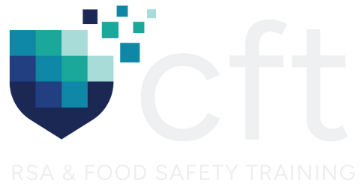An RSA certificate, also known as Responsible Service of Alcohol certification, is a qualification required by law for anyone involved in the sale or service of alcohol in Australia. This certification ensures that individuals understand their legal responsibilities and are equipped with the necessary knowledge and skills to promote responsible alcohol consumption.
At CFT, we offer comprehensive RSA courses that cover all aspects of responsible alcohol service. Our courses are designed to provide you with the knowledge and skills needed to confidently handle situations involving alcohol service and ensure the safety of both customers and staff.
RSA courses at CFT are delivered by industry experts who have extensive experience in the hospitality sector. We provide flexible learning options, including online courses that allow you to study at your own pace. With our interactive learning materials and engaging assessments, you can easily grasp the key concepts required for obtaining your RSA certificate.
By choosing CFT for your RSA certification, you will gain a valuable qualification that is recognised across Australia. Start your journey towards a successful career in hospitality today!
Unlocking Success with RSA Certification: A Beginners Guide
In today’s competitive job market, having the right qualifications can make all the difference in securing a rewarding career path. One such certification that holds significant value, particularly in the hospitality industry, is the Responsible Service of Alcohol (RSA) certification. This comprehensive guide aims to delve into the intricacies of RSA certification, exploring its importance, the process of obtaining it, its benefits, and its impact on both individuals and establishments.
Understanding RSA Certification
RSA certification is a crucial accreditation for individuals involved in the service or sale of alcohol. It is designed to educate and empower professionals with the knowledge and skills necessary to responsibly handle alcohol in licensed venues. While the specific requirements may vary depending on the region or state, the core principles of RSA certification focus on promoting the responsible service, consumption, and management of alcohol.
Importance of RSA Certification: The significance of RSA certification cannot be overstated in industries where alcohol is served or sold. For establishments such as bars, clubs, restaurants, and liquor stores, having staff members with RSA certification is not just a legal requirement in many jurisdictions but also a mark of professionalism and commitment to public safety. Additionally, individuals seeking employment in these sectors greatly enhance their employability and career prospects by obtaining RSA certification.
Process of Obtaining RSA Certification
The process of obtaining RSA certification typically involves completing a recognised training course provided by accredited training organisations. These courses cover a range of topics, including alcohol laws and regulations, strategies for responsible service, identifying and managing intoxicated patrons, conflict resolution techniques, and duty of care obligations. Depending on the state, and at the time of publishing, the training may be delivered in-person or online, with assessments to gauge understanding and competency.
Benefits of RSA Certification
The benefits of RSA certification extend beyond mere compliance with legal requirements. For individuals, it provides valuable knowledge and skills that are applicable not only to their current roles but also to future career opportunities within the hospitality industry. Employers benefit from having RSA-certified staff who can contribute to creating safe and enjoyable environments for patrons while minimising risks associated with alcohol service. Furthermore, establishments with a strong focus on responsible service are likely to enhance their reputation, attract more customers, and mitigate potential liabilities.
Impact on Individuals
RSA certification can have a transformative impact on individuals pursuing careers in the hospitality sector. It equips them with essential skills in communication, conflict resolution, and customer service, enhancing their effectiveness in roles that involve interacting with patrons. Moreover, RSA certification instils a sense of responsibility and accountability, empowering individuals to make informed decisions and uphold ethical standards in alcohol service.
Impact on Establishments
For establishments, the presence of RSA-certified staff can significantly improve operational efficiency and risk management. Trained employees are better equipped to identify and address potential issues related to alcohol service, such as underage drinking, over consumption, and disorderly conduct. By implementing responsible service practices, establishments can create a safer and more enjoyable environment for patrons, thereby fostering customer loyalty and positive word-of-mouth recommendations.
In short, RSA certification is a valuable asset for both individuals and establishments operating in the hospitality industry. By completing a recognised training course and obtaining RSA certification, professionals demonstrate their commitment to responsible alcohol service and enhance their career prospects. Likewise, establishments that prioritise responsible service practices not only comply with legal requirements but also differentiate themselves as reputable and customer-focused businesses. In an industry where reputation and safety are paramount, RSA certification serves as a cornerstone for success, promoting a culture of responsibility and professionalism in alcohol service.
Share this story
Recent Blog Posts

Chat to one of our trainers
Our team are here to help with your questions

















